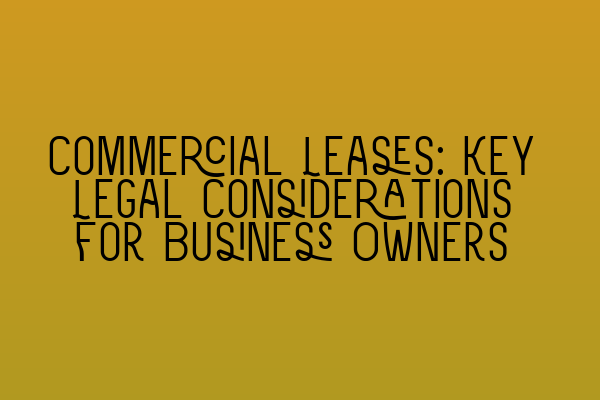**Commercial Leases: Key Legal Considerations for Business Owners**
Are you a business owner looking to secure a commercial space for your venture? Investing in a commercial lease agreement is a significant decision and requires careful attention to legal considerations to protect your interests. In this blog post, we will guide you through some key aspects you should keep in mind before entering into a commercial lease agreement. Understanding these concepts will help you negotiate favorable terms, have a smooth leasing experience, and avoid potential legal pitfalls.
**1. Lease Duration and Renewal Options**
When entering into a commercial lease, always consider the duration of the lease term. A longer lease term can provide stability for your business, while a shorter term avails flexibility. Negotiating an option to renew your lease at the end of the term is crucial, as it allows you to continue operating in the same location without undergoing the hassle of finding a new space.
**2. Rent and Additional Charges**
Negotiating the rent and understanding the charges associated with your commercial lease is essential. Determine whether the rent is fixed or if it will be subject to periodic increases. Additionally, familiarize yourself with any additional charges such as maintenance, insurance, and property taxes. Being aware of all financial obligations upfront will help you budget efficiently and avoid surprises.
**3. Alterations and Repairs**
Before leasing a commercial space, it is vital to clarify who will be responsible for undertaking repairs and maintaining the property. Review the lease agreement to understand your obligations and any limitations on alterations you may plan to make to suit your business needs. Negotiate clauses that allow you to make necessary changes to the premises while ensuring you restore it to its original condition at the end of the lease.
**4. Assignment and Subletting**
Consider the possibility of assigning or subletting your leased premises in the future. Business circumstances may change, and having the flexibility to do so can be advantageous. It is advisable to negotiate these clauses in your commercial lease agreement from the outset, ensuring you have the ability to assign your lease or sublet the premises should the need arise.
**5. Termination and Break Clauses**
Life is unpredictable, and business circumstances can change suddenly. Therefore, it is crucial to review the termination and break clauses in your commercial lease. These provisions determine the circumstances under which you or the landlord can end the lease agreement prematurely. Understanding these clauses will help you plan for unexpected situations without being tied to an unfavorable lease.
**6. Insurance and Indemnity**
Insurance coverage is necessary to safeguard your business and the leased premises from unforeseen damages or liabilities. Ensure that the lease agreement explicitly states who is responsible for obtaining insurance coverage and the type and extent of coverage required. Additionally, discuss indemnity clauses to determine whether you would be liable for any damages caused by your business operations on the property.
**7. Compliance with Planning and Building Regulations**
Before entering into a commercial lease, it is essential to ascertain that the property complies with all planning and building regulations. Failure to do so could result in legal consequences and additional costs. Engage the services of a qualified surveyor or solicitor who can assist in carrying out due diligence to ensure the property meets all necessary regulatory requirements.
**8. Dispute Resolution**
In the event of a dispute arising between you and the landlord during the lease term, having a dispute resolution mechanism in place can save significant time, money, and stress. Consider including an arbitration or mediation clause in your commercial lease agreement to provide an alternative to traditional court proceedings should a dispute arise.
Navigating the complexities of commercial leases requires expert guidance to ensure that your interests are protected. At SQE Property Law & Land Law, our team of experienced solicitors specializes in commercial leases and can provide you with the legal advice and support you need. Contact us today to discuss your business’s leasing requirements and explore how we can assist you in securing a commercial space that suits your needs.
Remember, a well-negotiated and carefully drafted commercial lease agreement is the foundation of a successful business venture. Take the time to understand and address the legal considerations outlined in this blog post, and you’ll be well on your way to making informed decisions and protecting your business interests in the leasing process.
